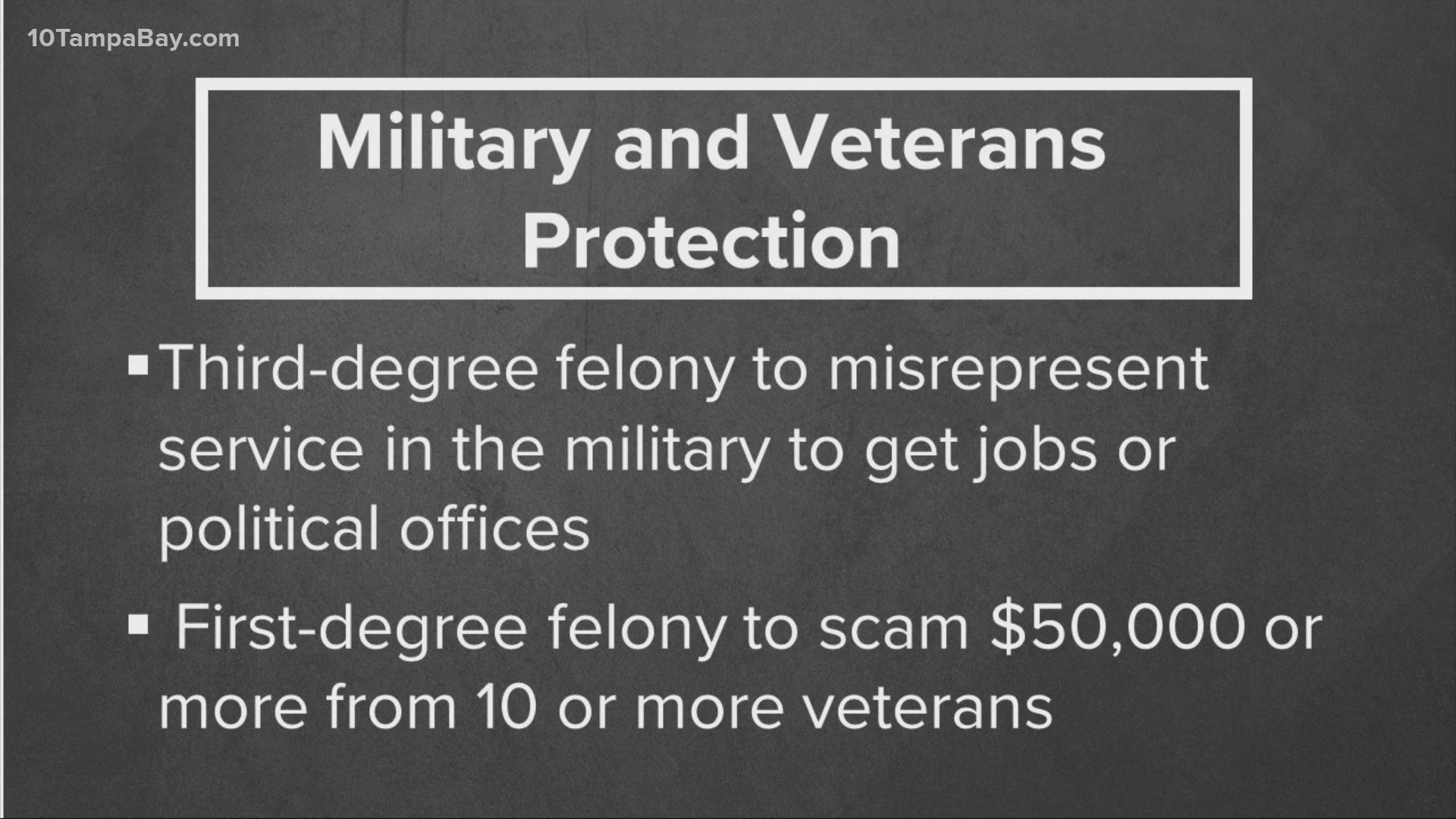TALLAHASSEE, Fla. — Earlier this year, Gov. Ron DeSantis signed multiple bills into law, many of which took effect on July 1.
However, more than a few will become law on Oct. 1.
Here's a list of those new laws:
- Allows the DHSMV to issue specialty license plates for fleet or motor vehicle dealer cars with a cap at 150 specialty plates.
- Increases the required number of voucher sales needed within 24 months (2 years) before DHSMV will manufacture a specialty plate, increased from 1,000 to 3,000 vouchers. An out-of-state college or university must sell a minimum of 4,000 vouchers in that time.
- The DHSMV must discontinue the specialty plate with the fewest numbers of plates in circulation on Jan. 1 of each year.
- Creates a uniform annual use fee for specialty license plates. Specifically, the annual use fee will be $25 for any specialty license plate required to be developed, unless otherwise specified.
- A revision of an existing law that prohibits a person from misrepresenting themselves as a member or veteran of the U.S. Armed Forces.
- Amends existing law that forbids misrepresentation while a person is soliciting for charitable contributions or seeking a material gain, and now specifies that material gain obtaining by paid employment or public office is also prohibited.
- Like the pre-existing law, a person who violates the law commits a third-degree felony, punishable by up to five years in prison and a $5,000 fine.
- Creates the "Florida Veterans Protection Act," amending the White Collar Crime Victim Protection Act.
- A person violates this law if they obtain or attempt to obtain $50,000 or more by committing at least two associated white-collar crimes against 10 or more veterans.
- It is a first-degree felony; if a person is convicted of the crime, they must pay all court costs and restitution to all who were victimized. The court can also order payment of a fine of $500,000 or double the value of pecuniary gain or loss, whichever is greater.
- Named the "Kristin Jacobs Ocean Conservation Act."
- Prohibits the import, export and sale of shark fins with certain exceptions.
- Requires FWC to evaluate the potential economic impact to the commercial shark fishing industry associated with the shark fin ban in Florida, and to report findings to the governor and legislature by Dec. 31, 2021.
- Prohibits a defendant who is over 18 from receiving bail on a post-trial motion or appeal for any offense requiring sexual offender registration or sexual predator registration under Florida law when the person victimized is a minor.
- Increases the existing penalty from a first-degree misdemeanor to a third-degree felony for a second or subsequent offense.
- Specifies being naked in public in a "vulgar or indecent manner" is a violation of Florida law.
- Provides an exception to mothers breastfeeding or a person who is naked in a place set aside for that purpose.
- Adds the crime to the list of misdemeanor offenses that an officer can make a warrantless arrest.
- Adds medical marijuana, hemp, industrial hemp and vapes to list of prohibited contraband at state correctional institutions, county detention facilities, juvenile detention facilities, juvenile commitment programs and facilities operated by the DCF and APD.
- Makes the offense a third-degree felony for medical marijuana, hemp or industrial hemp.
- Makes the offense a first-degree misdemeanor for vapes.
- Adds cellphones or other portable communication devices to a list of prohibited contraband, making it a first-degree misdemeanor.
- Ranks previously unranked offense of bringing a firearm, deadly weapon or controlled substance to a level 4 offense.
- Makes changes to the current law of towing vehicles and vessels.
- Requires Auditor General to conduct an operational and financial audit of each large commercial service airport at least once every seven years.
- Body camera recordings, or portion of the recording, may be kept confidential and exempt from public disclosure if the recording is taken within the interior of a private resident, within the interior of a health care, mental heath care or social services facility or in a place "a reasonable person" would expect to be private.
- Amends law that would've repealed a current exemption from public records disclosure of email addresses provided to the DHSMV for the purpose of sending notifications and renewal notices.
- Amends law that would've repealed current exemptions from public records disclosure for certain information in a criminal investigation that reveals the identity of individuals victimized by human trafficking.
- Tampa International Airport teams up with BayCare to offer COVID-19 tests to passengers
- 'Everyone was chipping in': Tampa Bay Lightning win Stanley Cup
- National Coffee Day: Three coffee shop beverages to make at home
- New poll: One-third of parents won't get their kids flu shots
- Here's how to find your ballot drop-off location
- What you need to know about the 6 constitutional amendments on Florida ballots
- NY Times: Trump paid $750 in US income taxes in 2016,2017
- Tropics 'wake up,' new disturbance to watch
►Breaking news and weather alerts: Get the free 10 Tampa Bay app
►Stay In the Know! Sign up now for the Brightside Blend Newsletter

